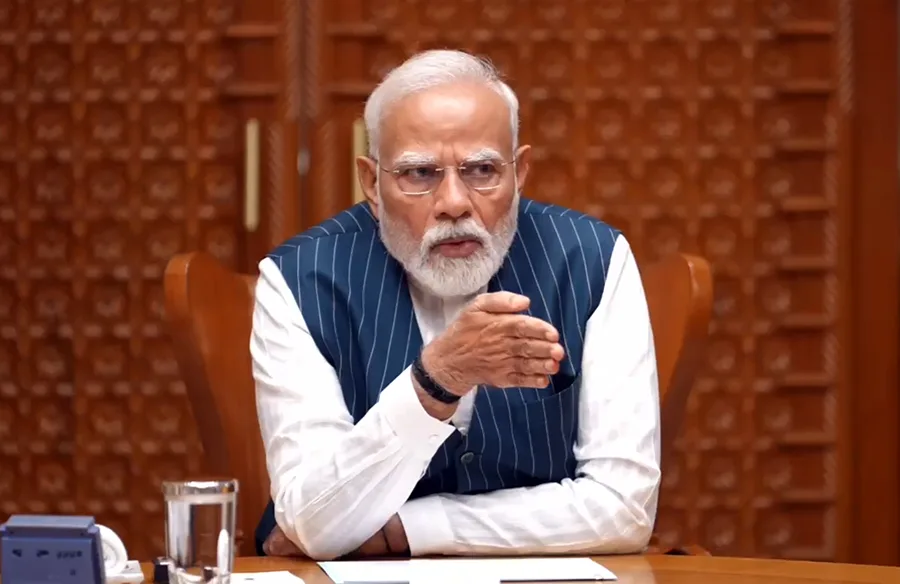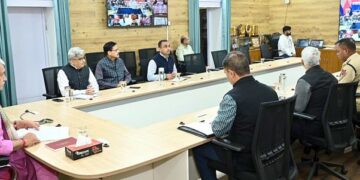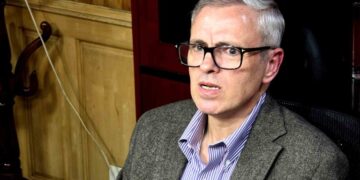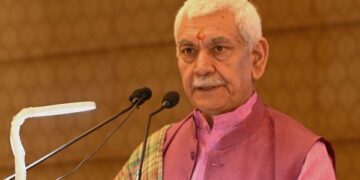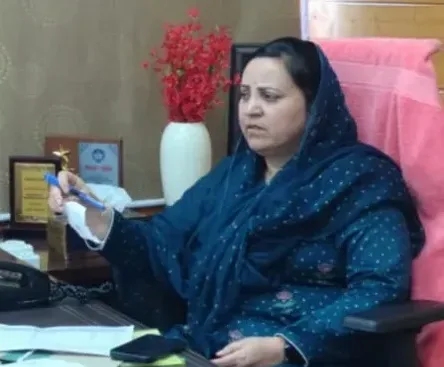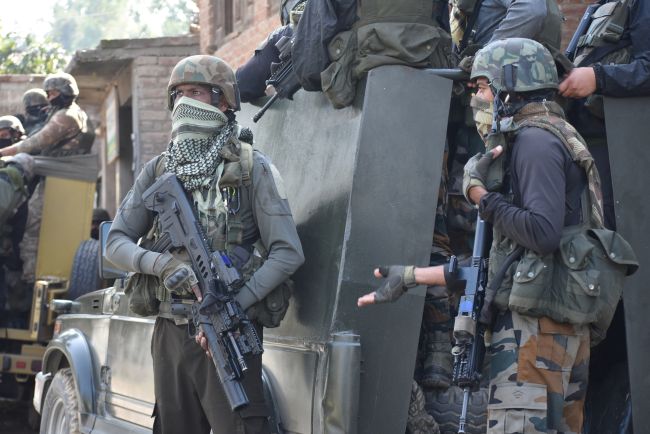New Delhi: Prime Minister Narendra Modi on Wednesday chaired a meeting of the Cabinet Committee on Security, the first since the halt in the India-Pakistan military standoff, and is learnt to have discussed the security situation in the wake of the pause on Operation Sindoor.
He was joined by Defence Minister Rajnath Singh and Home Minister Amit Shah in the meeting, where they discussed the current situation and India’s preparedness.
The prime minister later chaired a meeting of the Union Cabinet.
Asked about ministers lauding the prime minister during the cabinet meeting, Union Minister Ashwini Vaishnaw said, “Operation Sindoor was an example of India’s pride, the role of armed forces and the decisive leadership, besides the new doctrine. This is very commendable for the country.”
At the briefing, Vaishnaw announced the cabinet’s nod to a Rs 3,706 crore semiconductor plant at Jewar in Uttar Pradesh and said, “You saw the use of science and technology in Operation Sindoor and how India has emerged stronger with the use of technology.”
In his first address to the nation after Operation Sindoor on Monday, Prime Minister Narendra Modi sternly warned Pakistan that India will not succumb to nuclear blackmail and sent a clear message to the world: terror and trade, terror and talks cannot go together.
“Operation Sindoor is India’s new policy against terrorism and our unwavering pledge for justice. It is the new normal. We have only kept in abeyance our operations against Pakistan and the future will depend on their behaviour,” Modi said in the 22-minute address.
Meanwhile, US President Donald Trump’s claim of mediation between India and Pakistan in bringing about a halt in hostilities has been rejected by India. Despite India’s rebuttal, Trump again claimed that his government “brokered a historic ceasefire” between the two countries.
Want to encourage direct communication between India, Pak: US State Department
The US said it encourages “direct communication” between India and Pakistan and commends Prime Minister Narendra Modi and Pakistan Prime Minister Shehbaz Sharif for choosing the path of peace.
India and Pakistan reached an understanding on Saturday to end the conflict after four days of intense cross-border drone and missile strikes.
Indian government sources in New Delhi have been maintaining that the Director Generals of Military Operations (DGMOs) of India and Pakistan reached an understanding to stop all firings and military actions on land, air and sea, with immediate effect. They said no third party was involved.
“We also welcome the ceasefire between India and Pakistan and commend Prime Ministers Modi and Sharif for choosing the path of peace. As President Trump said, their decision reflects strength, wisdom, and fortitude,” Principal Deputy Spokesperson at the State Department Thomas Pigott said at a press briefing Tuesday.
“We urge both sides to maintain direct communication to preserve regional stability,” he said.
In response to a question on whether, in his calls with the Pakistani leaders Secretary of State Marco Rubio had received any commitment that they (Pakistan) will dismantle terrorist infrastructure, Pigott said he is not going to talk about private diplomatic conversations.
“What I can say is reiterating what we’ve been saying for a couple days now is that we welcome the ceasefire reached between India and Pakistan this weekend and we commend both prime ministers for choosing the path of peace.
“The President Truthed about this. He was very clear in terms of that. We also want to encourage direct communication between the parties. That is something we’ve also been clear about as well,” Pigott said, referring to the social media platform Truth Social.
On India refusing any US effort to mediate and how hopeful is Washington to bring the two countries together in the same room for talks, Pigott said: “Well, I’m not going to speculate on that. What I can say is that we encourage direct communication. We have been clear on that. We continue to encourage that direct communication.”
“The President has been clear on that. And the President, as I said, has also been clear in praising both prime ministers for choosing the path towards peace and the wisdom and fortitude that that shows.”
On whether the US has sent a team to Pakistan following reports of leaks of nuclear radiation, he said he has nothing to preview on that at this time.
He added the US is happy to see the “ceasefire”. “That is what we are happy to see. That’s where our focus remains. And we want to see a ceasefire be maintained, and we want to encourage direct communication. That is our focus here. Our focus is the ceasefire. Our focus is on encouraging direct communication. That’s where our focus is going to remain. The President has spoken on this,” he said.
“…the President – President Trump – is a peacemaker. He’s a peacemaker. He values peace. He’s also a dealmaker, and he has shown that again and again and again in terms of both pursuing an America First agenda but also pursuing peace and wanting to see peace and conflicts come to an end,” Pigott added.
In response to another question, Pigott reiterated that Washington is happy to see a ceasefire. “We want to see direct communication between the parties. And when it comes to, again, solving conflicts that have existed in regions around the world, the President wants to solve those conflicts when he can.”
“He’s often said that he stands ready to aid in the pursuit of peace; he stands ready to help. And the President is a dealmaker. He is a peacemaker. He has shown that again and again. And we’re seeing the results of that from the past hundred days and even just this last week.”
India carried out precision strikes under ‘Operation Sindoor’ on terror infrastructure early on May 7 in response to the April 22 Pahalgam terror attack that killed 26 people. Following the Indian action, Pakistan attempted to attack Indian military bases on May 8, 9 and 10.
The two countries reached an understanding on May 10.
Will support efforts to deal with terrorist threat: UK on India-Pakistan conflict
The UK stands ready to work with India and Pakistan to ensure a lasting ceasefire and will lean in to support efforts on both sides to deal with “horrendous terrorism”, Foreign Secretary David Lammy has told the British Parliament.
During a debate on Kashmir in the House of Commons on Tuesday, Lammy said he remains in regular contact with his counterparts in New Delhi and Islamabad to encourage both nations to maintain their commitment to “hard-won areas of diplomatic cooperation”, such as the Indus Waters Treaty.
“The UK welcomes the commitments made by India and Pakistan to pause any further military action. Given our strong and close relationships with both countries, the UK stands ready to work with both sides to make a lasting ceasefire a reality,” Lammy told MPs.
“Let me be clear that the horrendous terrorism we saw — 26 nationals stripped and shot — was horrific, and we condemn it. We will continue to work with close partners to deal with this terrorist threat… all of us have to lean in and ensure that we are supporting efforts on both sides to deal with horrendous terrorism. That is what, in the end, will maintain an enduring peace,” he said.
Shadow foreign secretary Priti Patel raised the UK Opposition’s concern over the “ongoing presence of terrorist infrastructure in Pakistan” and questioned the minister on Britain’s role in combating the threat.
“What further discussions have taken place to secure commitments from the Pakistani government that they will dismantle terrorist infrastructure, and what role will Britain play in supporting the removal of terrorist threats within Pakistan, because that is what will improve stability and security in the region,” questioned Patel.
Lammy reiterated the UK government stance of Kashmir issue being a bilateral one for India and Pakistan to resolve, taking into account the wishes of the Kashmiri people.
He added: “We do need proper communication between India and Pakistan, and that must happen not just on military channels but on political channels… Those communications are poor.
“We do need confidence-building measures and to ensure that we are dealing with terrorism where it acts, and of course the United Kingdom will lean in to that. Above all, we need dialogue.
“The international community can play a role, particularly where countries have relations with both countries. That is why we have been talking to the United States, that is why we have been talking to Saudi, and that is why we are working with the UAE,” he added.
Hope parties will use deal for outstanding issues: UN spokesperson on India, Pak understanding
With India and Pakistan having reached an understanding to end hostilities “we’re in a better place,” a spokesperson for UN Secretary General Antonio Guterres said and hoped the countries would use it to deal with their “outstanding issues”.
“The ceasefire is holding. I think we have seen we’re in a better place than we were before. We hope that the ceasefire will continue to hold, and we hope that the parties will use this to deal with a lot of the outstanding issues between them,” Stephane Dujarric, spokesperson for the Secretary-General, said at the daily press briefing Tuesday.
Guterres had earlier welcomed the “ceasefire” agreement between India and Pakistan, describing it as a “positive step” toward ending current hostilities and easing tensions.
Guterres said he hopes “the agreement will contribute to lasting peace and foster an environment conducive to addressing broader, longstanding issues between the two countries,” Dujarric had said in a statement on Saturday.
The United Nations stands ready to support efforts aimed at promoting peace and stability in the region, it had said.
Meanwhile, New York City Mayor Eric Adams said in a post on X that “New York City is home to vibrant Indian and Pakistani communities, whose ties to their homelands run deep. The recent ceasefire brings hope to many New Yorkers, and we stand with all those who long for lasting peace.”

